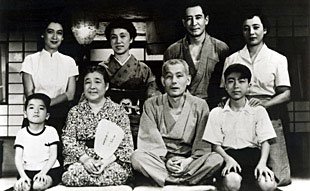 Tokyo Story (Tokyo Monogatari, 1953) is about an elderly couple who visit their grown children in the city where they must face their children’s indifference as the couple becomes a burden to their children’s busy lives. It was written by Yasujiro Ozu and Kogo Noda. It was directed by Yasujiro Ozu. Its brilliant cast includes Chishu Ryu, Chieko Higashiyama and Setsuko Hara.
Tokyo Story (Tokyo Monogatari, 1953) is about an elderly couple who visit their grown children in the city where they must face their children’s indifference as the couple becomes a burden to their children’s busy lives. It was written by Yasujiro Ozu and Kogo Noda. It was directed by Yasujiro Ozu. Its brilliant cast includes Chishu Ryu, Chieko Higashiyama and Setsuko Hara.I saw Tokyo Story for the first time during the Manila International Film Festival (MIFF) sometime in 1982 (or was it 1981?) when they had a retrospective of Ozu films. It’s been my favorite movie since then.
Tokyo Story does not adhere to the screenwriting rules that Syd Field, Bob McKee, John Truby, Linda Seger and company teach in their books and/or workshops. Although Ozu loved Hollywood films and Tokyo Story was even inspired by a Hollywood movie (Leo McCarey’s Make Way for Tomorrow), Tokyo Story defies Hollywood convention. Unlike most Hollywood films, Tokyo Story has no real villain, no confrontations and/or progression of obstacles, no real suspense, no pinches or major turning points 60 minutes and 90 minutes into the film, the camera barely moves and oftentimes changes orientation, scenes show character entrances and exits instead of chopping them off, almost plotless, does not follow the usual hero’s journey, pacing is deliberate, etc. But it works. Isn't that great?
2 comments:
It appears that you just started this blog last month, Toto (is that your name or did you just adopt the character of Cinema Paradiso? he he!).
TOKYO STORY is one of my favorite Japanese films (I haven\'t seen much). You know how Manila is like these days when it comes to piracy matters. One of the best things that ever happened to cineastes back here (\'cineaste\' sounds so snobbish, elitist, doesnt it?) is that along with pirated contemporary films came the classics - from the Criterion Collection to many others that date from the early 1900s until the 80s.
There was a deluge of Kurosawa, to begin with. I almost got to complete his films if it were not for the sporadic raids they did at the points of entry (the best copies came from Taiwan).
One of my beloved finds is this film - calm, poignant, human. Japanese films have these qualities that can make any hardened man be moved into tears.
Equally unforgettable is the daughter-in-law (oh, that all daughter-in-laws were like her!) whose sense of family is connected only by her wedding ring which she refused to part with despite the death of her husband.
Sigh. I\'d love to watch it again soon.
- Dylan
Hey Dylan. Thanks.
Yes, I started blogging only last month for lack of anything better to do. It's starting to get oppressively cold here again and going out is ceasing to be an option.
Yes, the name is from Tornatore's film. I almost changed the name after I learned what it means in another language. (Go figure.) But my fascination for that film prevailed. I saw Cinema Paradiso for the first time when I sat through Fr. Nick Cruz's film class in Ateneo. The film really spoke to me.
Re. pirated DVDs, do you know that they are also being sold openly here? You could see them being peddled along the subway train passageway and on the platform in Manhattan, particularly in Times Square station. And to think that NYPD officers are everywhere!
I also like Kurosawa and I've seen most of his films. But many here consider Ozu as the greatest Japanese filmmaker and one of the best in the world. I've seen most of Ozu's films. You've got to see them because they don't make those kind of films anymore.
Post a Comment